Comics /
Cult Favorite
How old is Batman?
By
Philip Schweier
July 24, 2003 - 09:00
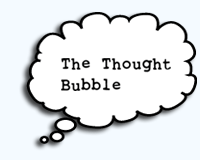 How Old Is Batman?
How Old Is Batman?
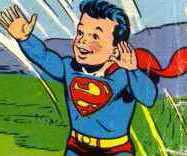 Excuse me, perhaps I should make myself more clear. Batman, as a character, made his public debut in 1939, so that would make him 64.
Excuse me, perhaps I should make myself more clear. Batman, as a character, made his public debut in 1939, so that would make him 64.
But that's not what I mean. I suppose I should ask "How old is Bruce Wayne?" In the world of comics the timeline as we know is highly compressed. Stories that take place in a single day can often take several months to tell, and it's obvious that comic characters don't age naturally (except for Gasoline Alley and For Better, For Worse).
It is generally taken for granted that Bruce Wayne and Clark Kent are approximately the same ages. There's quite a bit written on the Man of Steel over the years, and in all the research I've done, the consensus is that he is 28. Even if we choose not to be that specific, I think it's safe to say he is in his late 20s, possibly early 30s.
So let's say Bruce Wayne is about 30. That begs the question of how old Dick Grayson might be. It's my understanding he became Robin around the age of nine, and adopted the Nightwing identity around the age of 21. So let's presume he's at least 24, and 15 years have passed since he became Robin. Which, if Bruce is around 30 (because Superman is 28), would mean Bruce became Batman at the age of 15. To borrow a phrase, fuzzy math.
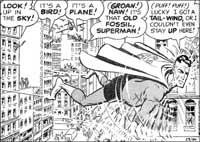 Well, maybe Clark is older (early 40s?). I tend to think so, partly because the earliest incarnation I saw of the Man of Steel was George Reeves. Not only was he a bit long in the tooth to be playing the role in the latter days of the Adventures of Superman, but in the 1960s and '70s, some Curt Swan drawings gave him a rather large forehead, so much so that it appeared to be a receding hairline.
Well, maybe Clark is older (early 40s?). I tend to think so, partly because the earliest incarnation I saw of the Man of Steel was George Reeves. Not only was he a bit long in the tooth to be playing the role in the latter days of the Adventures of Superman, but in the 1960s and '70s, some Curt Swan drawings gave him a rather large forehead, so much so that it appeared to be a receding hairline.
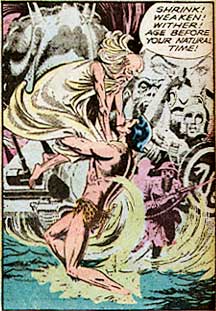 Some characters simply inhabit an era. The Lone Ranger will always be set in the Old West, but that's germain to the character. Sherlock Holmes has usually been placed in the 1890s (though his later adventures take place as late as 1914). Tarzan's original adventures spanned more than 40 years. He fought in both World Wars, but his eternal youth is explained in the novel Tarzan's Quest, the 19th in the 24-book series. Published in 1936, the story explains how Tarzan and Jane were given a secret jungle formula that halts aging altogether.
Some characters simply inhabit an era. The Lone Ranger will always be set in the Old West, but that's germain to the character. Sherlock Holmes has usually been placed in the 1890s (though his later adventures take place as late as 1914). Tarzan's original adventures spanned more than 40 years. He fought in both World Wars, but his eternal youth is explained in the novel Tarzan's Quest, the 19th in the 24-book series. Published in 1936, the story explains how Tarzan and Jane were given a secret jungle formula that halts aging altogether.
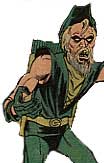 Such explanations for perpetual youth are common in the comics' world. It's often explained that a character is still youthful because of their healing factor, or their alien biology, or they're protected by the energy from which they draw their power. At the time of The Longbow Hunters miniseries, Green Arrow was 50. I'm willing to accept he was resurrected a few years younger than when he died.
Such explanations for perpetual youth are common in the comics' world. It's often explained that a character is still youthful because of their healing factor, or their alien biology, or they're protected by the energy from which they draw their power. At the time of The Longbow Hunters miniseries, Green Arrow was 50. I'm willing to accept he was resurrected a few years younger than when he died.
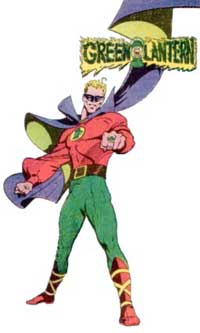 Recently I was reading some back issues of Green Lanterns, in which Jade speaks of her father being a hero in 1940s. Say Alan Scott was in his 20s when he became Green Lantern in 1941. That would make him in his 80s today. He doesn't appear quite that old, but I'll accept that the energy of the Green Lantern will retard the aging process. But he is a contemporary of Jay Garrick, the original Flash, who is middle aged. Shouldn't Jay's super-speed affect his metabolism, causing him to age quicker?
Recently I was reading some back issues of Green Lanterns, in which Jade speaks of her father being a hero in 1940s. Say Alan Scott was in his 20s when he became Green Lantern in 1941. That would make him in his 80s today. He doesn't appear quite that old, but I'll accept that the energy of the Green Lantern will retard the aging process. But he is a contemporary of Jay Garrick, the original Flash, who is middle aged. Shouldn't Jay's super-speed affect his metabolism, causing him to age quicker?
I won't dispute the setting of the Golden Age characters. Or any comic characters, for that matter. I'm not a rabid fanboy with issues of continuity, wanting all stories to follow an established time frame. Frankly I have better things to do with my time, and to adhere to such restrictions would take away from the enjoyment of comics overall.
 But I see these characters as living in something of an idealized universe. By idealized, I don't mean perfect, but one that is based on imagination rather than fact. For instance, many people have an idealized vision of the wheatfields of Kansas, but when producers of the 1978 Superman movie sought that idealized vision, they found it in Manitoba, Canada, rather than in Kansas itself.
But I see these characters as living in something of an idealized universe. By idealized, I don't mean perfect, but one that is based on imagination rather than fact. For instance, many people have an idealized vision of the wheatfields of Kansas, but when producers of the 1978 Superman movie sought that idealized vision, they found it in Manitoba, Canada, rather than in Kansas itself.
In the idealized world of super-heroes, mankind has encountered an immense variety of extraterrestrial races, and I would expect some events in which these characters inhabit have had historical impacts as significant as World War II. The truth is comic book heroes inhabit pocket universes bound by the covers of any given individual title one may buy.
Part of the appeal of comics is the broad range of continuities to follow. X-Men can follow the world portrayed in the movies, or either of the cartoon series, or the variations as depicted in any of the titles. By presenting multiple versions of comic book concepts, publishers can reach a wider audience of people who may not bother following one line of continuity. Reconciling them all into one timeline isn't necessary.
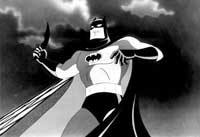 Watching the Batman animated series, you have criminals in overcoats and fedoras reminiscent of the 1940 or 50s. Bruce Wayne drives a Cord, which went out of production when World War II came along, but it's a classic automobile in any age. I should know, I grew up in the town that built them.
Watching the Batman animated series, you have criminals in overcoats and fedoras reminiscent of the 1940 or 50s. Bruce Wayne drives a Cord, which went out of production when World War II came along, but it's a classic automobile in any age. I should know, I grew up in the town that built them.
But these same characters have access to more modern technology. Metropolis of the animated Superman is a virtual utopian world of high speed highways and the advanced technology of STAR Labs and LexCorp. If a single continuity were to be established, I suggest it be vague enough to be easily adaptable for any given character. The film "Brazil" opens with a subtitle: "Sometime in the 20th century." Works for me.
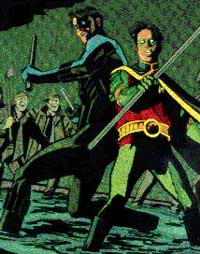 The comic book world is different from that in which we live, and maintaining a tight grasp of continuity can be a Sisyphean task. If one is so anal-retentive that one must hold super-heroes, super-villains, and their sundry supporting characters to real world restrictions, bear a few facts in mind: Men of steel do not fly, getting bit by an irradiated arachnid will not give you spider-like abilities, and if a vigilante dressed as bat, he would eventually be tracked down, exposed, and prosecuted by the authorities, if only for keeping a young boy in a cave . . .
The comic book world is different from that in which we live, and maintaining a tight grasp of continuity can be a Sisyphean task. If one is so anal-retentive that one must hold super-heroes, super-villains, and their sundry supporting characters to real world restrictions, bear a few facts in mind: Men of steel do not fly, getting bit by an irradiated arachnid will not give you spider-like abilities, and if a vigilante dressed as bat, he would eventually be tracked down, exposed, and prosecuted by the authorities, if only for keeping a young boy in a cave . . .
Praise and adulation? Scorn and ridicule? Email me at philip@comicbookbin.com.
Last Updated: November 29, 2025 - 16:51

 Excuse me, perhaps I should make myself more clear. Batman, as a character, made his public debut in 1939, so that would make him 64.
Excuse me, perhaps I should make myself more clear. Batman, as a character, made his public debut in 1939, so that would make him 64.

 Some characters simply inhabit an era. The Lone Ranger will always be set in the Old West, but that's germain to the character. Sherlock Holmes has usually been placed in the 1890s (though his later adventures take place as late as 1914). Tarzan's original adventures spanned more than 40 years. He fought in both World Wars, but his eternal youth is explained in the novel Tarzan's Quest, the 19th in the 24-book series. Published in 1936, the story explains how Tarzan and Jane were given a secret jungle formula that halts aging altogether.
Some characters simply inhabit an era. The Lone Ranger will always be set in the Old West, but that's germain to the character. Sherlock Holmes has usually been placed in the 1890s (though his later adventures take place as late as 1914). Tarzan's original adventures spanned more than 40 years. He fought in both World Wars, but his eternal youth is explained in the novel Tarzan's Quest, the 19th in the 24-book series. Published in 1936, the story explains how Tarzan and Jane were given a secret jungle formula that halts aging altogether.
 Such explanations for perpetual youth are common in the comics' world. It's often explained that a character is still youthful because of their healing factor, or their alien biology, or they're protected by the energy from which they draw their power. At the time of The Longbow Hunters miniseries, Green Arrow was 50. I'm willing to accept he was resurrected a few years younger than when he died.
Such explanations for perpetual youth are common in the comics' world. It's often explained that a character is still youthful because of their healing factor, or their alien biology, or they're protected by the energy from which they draw their power. At the time of The Longbow Hunters miniseries, Green Arrow was 50. I'm willing to accept he was resurrected a few years younger than when he died.
 Recently I was reading some back issues of Green Lanterns, in which Jade speaks of her father being a hero in 1940s. Say Alan Scott was in his 20s when he became Green Lantern in 1941. That would make him in his 80s today. He doesn't appear quite that old, but I'll accept that the energy of the Green Lantern will retard the aging process. But he is a contemporary of Jay Garrick, the original Flash, who is middle aged. Shouldn't Jay's super-speed affect his metabolism, causing him to age quicker?
Recently I was reading some back issues of Green Lanterns, in which Jade speaks of her father being a hero in 1940s. Say Alan Scott was in his 20s when he became Green Lantern in 1941. That would make him in his 80s today. He doesn't appear quite that old, but I'll accept that the energy of the Green Lantern will retard the aging process. But he is a contemporary of Jay Garrick, the original Flash, who is middle aged. Shouldn't Jay's super-speed affect his metabolism, causing him to age quicker?
 But I see these characters as living in something of an idealized universe. By idealized, I don't mean perfect, but one that is based on imagination rather than fact. For instance, many people have an idealized vision of the wheatfields of Kansas, but when producers of the 1978 Superman movie sought that idealized vision, they found it in Manitoba, Canada, rather than in Kansas itself.
But I see these characters as living in something of an idealized universe. By idealized, I don't mean perfect, but one that is based on imagination rather than fact. For instance, many people have an idealized vision of the wheatfields of Kansas, but when producers of the 1978 Superman movie sought that idealized vision, they found it in Manitoba, Canada, rather than in Kansas itself.
 Watching the Batman animated series, you have criminals in overcoats and fedoras reminiscent of the 1940 or 50s. Bruce Wayne drives a Cord, which went out of production when World War II came along, but it's a classic automobile in any age. I should know, I grew up in the town that built them.
Watching the Batman animated series, you have criminals in overcoats and fedoras reminiscent of the 1940 or 50s. Bruce Wayne drives a Cord, which went out of production when World War II came along, but it's a classic automobile in any age. I should know, I grew up in the town that built them.
 The comic book world is different from that in which we live, and maintaining a tight grasp of continuity can be a Sisyphean task. If one is so anal-retentive that one must hold super-heroes, super-villains, and their sundry supporting characters to real world restrictions, bear a few facts in mind: Men of steel do not fly, getting bit by an irradiated arachnid will not give you spider-like abilities, and if a vigilante dressed as bat, he would eventually be tracked down, exposed, and prosecuted by the authorities, if only for keeping a young boy in a cave . . .
The comic book world is different from that in which we live, and maintaining a tight grasp of continuity can be a Sisyphean task. If one is so anal-retentive that one must hold super-heroes, super-villains, and their sundry supporting characters to real world restrictions, bear a few facts in mind: Men of steel do not fly, getting bit by an irradiated arachnid will not give you spider-like abilities, and if a vigilante dressed as bat, he would eventually be tracked down, exposed, and prosecuted by the authorities, if only for keeping a young boy in a cave . . .
